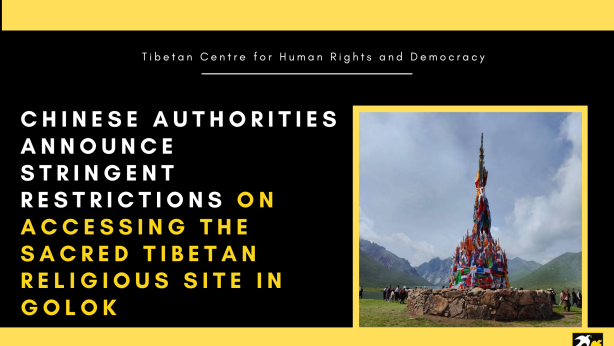Worst in recent years: 2022 Annual Report on human rights situation in Tibet
Dharamsala, India – The Tibetan Centre for Human Rights and Democracy (TCHRD) reported in its newly released annual report that the human rights situation in Tibet in 2022 has been one of the worst in recent years, with Chinese authorities doubling down on repressive Covid measures to further erode human rights. The ‘zero-Covid’ policy was ruthlessly enforced, causing tremendous suffering for Tibetans and others in the People’s Republic of China (PRC).
“We have seen an unprecedented expansion of the involuntary mass DNA collection. Millions of people in the Tibet Autonomous Region – including men, women, Buddhist monks, and children with no criminal record, are made to submit DNA samples,” said Mr Ngawang Lungtok, a researcher at TCHRD.
“This DNA collection drive, along with online surveillance, CCTV cameras, bugged homes, and checkpoints, are some of the many social control mechanisms to suppress dissent and bring the entire population under state control.”
Outside Tibet, exiled Tibetan activists and dissidents with relatives in Tibet are particularly vulnerable to the PRC’s multi-year campaign of transnational repression, which aims to silence criticism and expand the PRC’s control over emigrant and diaspora communities.
Efforts are being made on an alarming scale to cut off all contact between Tibetans living inside and outside Tibet to ensure that the PRC can hide its human rights violations in Tibet. Tibetans have been fired from their jobs, imprisoned, and tortured merely for staying in contact with relatives living abroad.
Through their laws, policies, and practices, the Chinese authorities unduly and disproportionately restrict and breach the right to privacy for Tibetans in Tibet, thereby denying them other fundamental human rights, such as freedom of expression.
Numerous measures are put in place to establish absolute government control over the state education system. The imposition of Chinese medium education, government boarding schools, and the crackdown on private schools has resulted in grave human rights violations. Tibetan culture and language are marginalised, and related rights are denied under the forced cultural assimilation policy.
Many Tibetans are denied the right to manifest his or her religion or belief in worship, observance, practice and teaching. Tibetan writers and intellectuals receive heavy prison sentences following lengthy pretrial detention. Tibetan political prisoners and other detainees died from torture injuries without having been charged, in pre- or post-trial detention, or after their release. Many remain held in unofficial detention facilities with no legal oversight that would ensure the prevention of torture and other grave human rights violations.
Despite facing extreme risks of enforced disappearance, torture, and death, three Tibetans died in self-immolation protests to mark the 10 March anniversary of Tibetan National Uprising Day. Chinese laws have systematically and cumulatively made it virtually impossible for Tibetans to peacefully assemble and associate.
“Through the recommendations provided to the Chinese government and the international community in the report, we hope concrete measures will be undertaken at the earliest to prevent and punish human rights violations in Tibet,” said Mr Nyiwoe, a researcher at TCHRD.
“At a time when China is projecting itself as an important international player with the largest population and the second biggest economy, gross human rights violations continue in Tibet and elsewhere in the PRC. The international community has the collective responsibility to hold China accountable for its harsh treatment of Tibetans and many others.”

Download the full report in English here
Download the full report in Tibetan here
Download the full report in Chinese here


